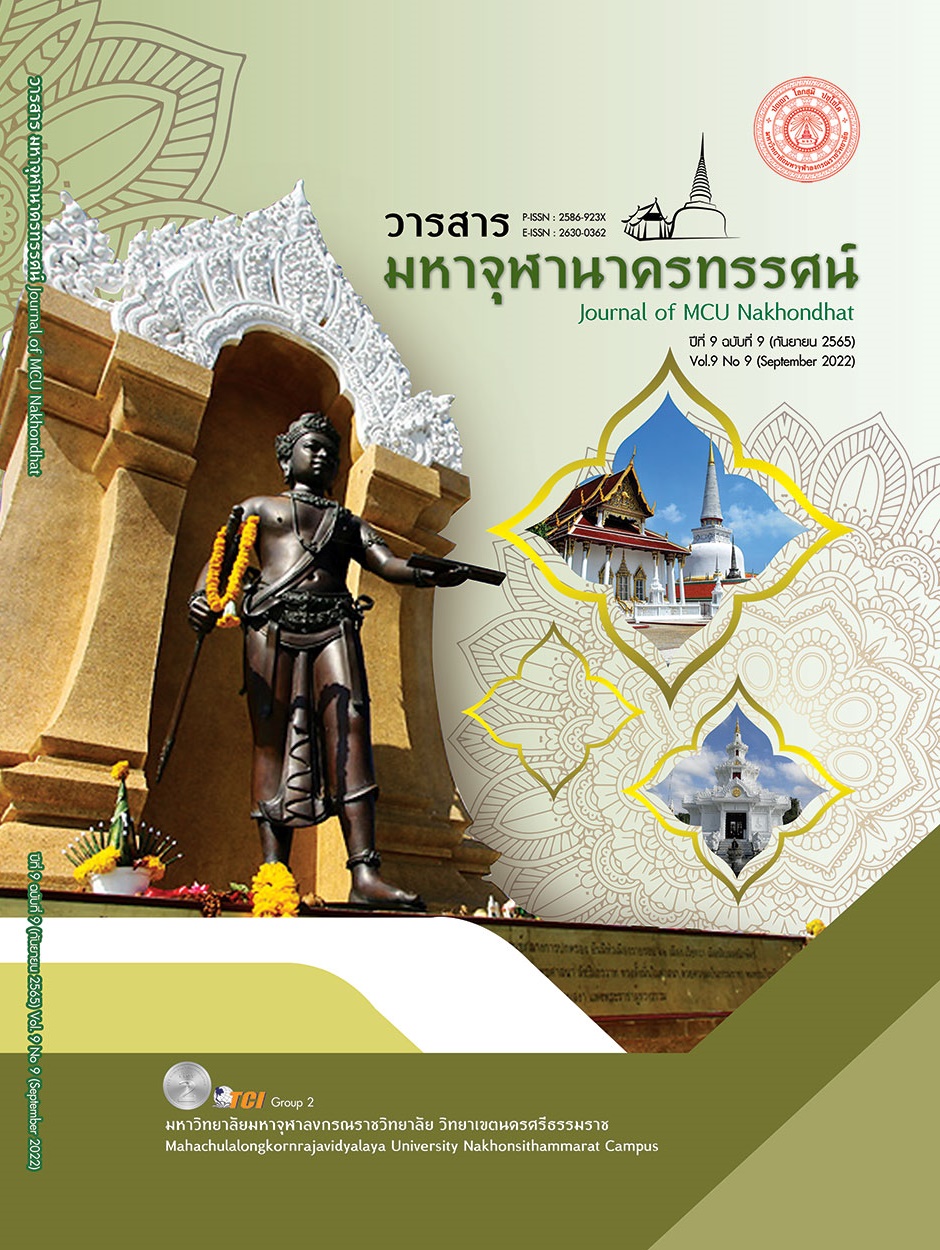KNOWLEDGE APPLICATION OF LOCAL WISDOM IN COMMUNITY SELF - MANAGEMENT ACCORDING TO THE SUFFICIENCY ECONOMY PHILOSOPHY
Main Article Content
Abstract
The objectives of this research were 1) to study the way of life and living of local wisdom in community self-management according to the Sufficiency Economy Philosophy 2) to study the knowledge of local wisdom in community self-management and 3) to develop the model of knowledge application of local wisdom in community self-management Qualitative research by in-depth interviews Choose a specific example The key informants were divided into 3 groups community leaders citizens and educational institutions in Ban Tha Hat, Thammamoon sub-district, Muang district, Chainat province. Data were analyzed by descriptive analysis. The results of this research revealed that 1) Way of life and local wisdom in community self-management and the living in the community were simple. In the community, there is love, unity and sacrifice for each other. Self-management of local wisdom in agricultural communities was self-reliant, stability and pride in their career. 2) Knowledge of local wisdom in community self-management the community has a strategic plan and work plan. There is a knowledge base system and a holistic way of thinking in terms of an integrated thinking system. Adopt the philosophy of sufficiency economy driven by community self-management bring knowledge from local wisdom to develop resulting in cooperation from many parties. and 3) The model of knowledge application of local wisdom in community self-management brought the knowledge both inside and outside the community to manage themselves in order to bring the local wisdom knowledge to develop the community that extending from previous knowledge to transfer knowledge and experience to the community and store knowledge in individual and document formats that brought the knowledge to the community through knowledge exchange training which creates to flow of knowledge that will facilitate the success of the community.
Article Details

This work is licensed under a Creative Commons Attribution-NonCommercial-NoDerivatives 4.0 International License.
References
กรมส่งเสริมการเกษตร. (2561). ความรู้เบื้องต้นเกี่ยวกับภูมิปัญญาท้องถิ่น. กรุงเทพมหานคร: กรมส่งเสริมการเกษตร.
กาญจนา เบ็ญจะวะชิร. (1 สิงหาคม 2565). รูปแบบประยุกต์ใช้ความรู้ภูมิปัญญาท้องถิ่นในการจัดการตนเองของชุมชน. (หทัยชนก คะตะสมบูรณ์, ผู้สัมภาษณ์)
จันติมา จันทร์เอียด. (2564). รูปแบบการจัดการความรู้ภูมิปัญญาท้องถิ่นด้านหัตถกรรม เครื่องจักสาน: กรณีศึกษาวิสาหกิจชุมชน จังหวัดสงขลา. วารสารวิทยาการจัดการมหาวิทยาลัยสงขลานครินทร์, 38(2), 139-167.
เทศบาลตำบลธรรมามูล. (2564). สภาพทั่วไป บ้านท่าหาด ตำบลธรรมามูล อำเภอเมือง จังหวัดชัยนาท. เรียกใช้เมื่อ 13 กันยายน 2564 จาก https://www.thanmamoon. go.th/condition.php
บุญทัน ดอกไธสง. (2558). นโยบายสาธารณะศาสตร์. พระนครศรีอยุธยา: มหาวิทยาลัยมหาจุฬาลงกรณราชวิทยาลัย.
เพ็ญพร ชำนาญพันธ์. (2555). การจัดการเศรษฐกิจครัวเรือนโดยหลักเศรษฐกิจพอเพียงของชาวนากรณีศึกษาบ้านโนนแดง ตำบลบุ่งคล้า อำเภอหล่มสัก จังหวัดเพชรบูรณ์. ใน วิทยานิพนธ์รัฐประศาสนศาสตรมหาบัณฑิต สาขาวิชารัฐประศาสนศาสตร์. มหาวิทยาลัยนเรศวร.
วงศ์ธีรา สุวรรณิน และสุรเชษฐ์ โซวเกียรติรุ่ง. (2562). การพัฒนาชุมชนต้นแบบบนฐานคติวิถีชีวิตเศรษฐกิจพอเพียงและภูมิปัญญาท้องถิ่น เพื่อส่งเสริมการท่องเที่ยวเชิงสร้างสรรค์ของชุมชนในจังหวัดหนองคาย. BU ACADEMIC REVIEW, 18(1), 34-49.
วิเชียร บัวแก้ว. (1 สิงหาคม 2565). วิถีชีวิตชุมชนท่าหาด. (หทัยชนก คะตะสมบูรณ์, ผู้สัมภาษณ์)
ศรายุทธ คชพงศ์ และคณะ. (2563). การจัดการตนเองของชุมชนและท้องถิ่นในภาวการณ์เปลี่ยนแปลงในปัจจุบัน. วารสาร มจร พุทธปัญญาปริทรรศน์, 5(3), 191-202.
สนธยา ชมพู. (2558). นโบายสาธารณะและการวางแผนกับการจัดการวิสาหกิจชุมชน. เพชรบูรณ์: มหาวิทยาลัยราชภัฏเพชรบูรณ์.
สัญญา เคณาภูมิ. (2557). วิสาหกิจชุมชนกับการพัฒนาท้องถิ่น. มหาสารคาม: มหาวิทยาลัยราชภัฏมหาสารคาม.
สุชีรา ธนาวุฒิ และคณะ. (2560). การสังเคราะห์องค์ประกอบปรัชญาของเศรษฐกิจพอเพียงไปปฏิบัติจริงในการพัฒนาธุรกิจ. วารสารวิทยาลัยพาณิชยศาสตร์บูรพาปริทัศน์, 12(1), 46-57.
สุภางค์ จันทวานิช. (2565). วิธีการวิจัยเชิงคุณภาพ. (พิมพ์ครั้งที่ 18). กรุงเทพมหานคร: สำนักพิมพ์แห่งจุฬาลงกรณ์มหาวิทยาลัย.
อำนาจ นกครุฑ. (4 สิงหาคม 2565). การประยุกต์ใช้ความรู้ภูมิปัญญาท้องถิ่นในการจัดการตนเองของชุมชน. (หทัยชนก คะตะสมบูรณ์, ผู้สัมภาษณ์)


